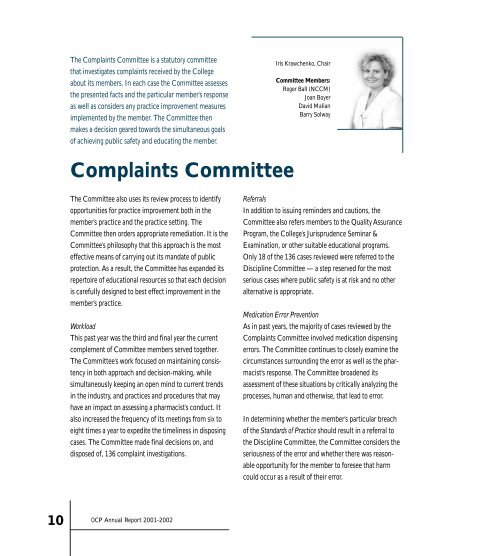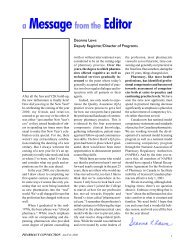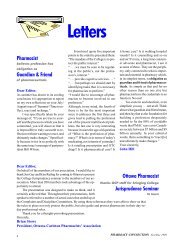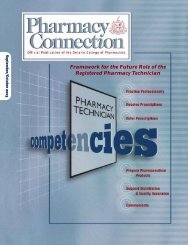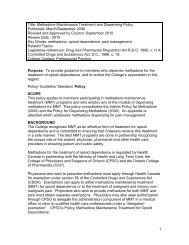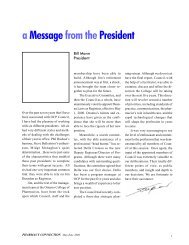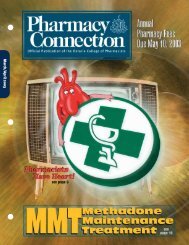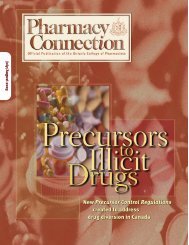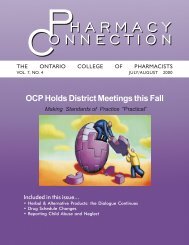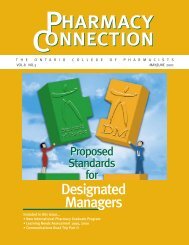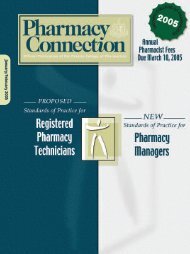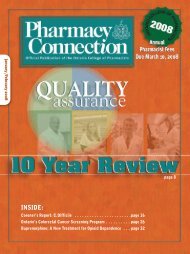OCP Annual Report 2001/2002 - Ontario College of Pharmacists
OCP Annual Report 2001/2002 - Ontario College of Pharmacists
OCP Annual Report 2001/2002 - Ontario College of Pharmacists
You also want an ePaper? Increase the reach of your titles
YUMPU automatically turns print PDFs into web optimized ePapers that Google loves.
The Complaints Committee is a statutory committee<br />
that investigates complaints received by the <strong>College</strong><br />
about its members. In each case the Committee assesses<br />
the presented facts and the particular member’s response<br />
as well as considers any practice improvement measures<br />
implemented by the member. The Committee then<br />
makes a decision geared towards the simultaneous goals<br />
<strong>of</strong> achieving public safety and educating the member.<br />
Iris Krawchenko, Chair<br />
Committee Members:<br />
Roger Ball (NCCM)<br />
Joan Boyer<br />
David Malian<br />
Barry Solway<br />
Complaints Committee<br />
The Committee also uses its review process to identify<br />
opportunities for practice improvement both in the<br />
member’s practice and the practice setting. The<br />
Committee then orders appropriate remediation. It is the<br />
Committee’s philosophy that this approach is the most<br />
effective means <strong>of</strong> carrying out its mandate <strong>of</strong> public<br />
protection. As a result, the Committee has expanded its<br />
repertoire <strong>of</strong> educational resources so that each decision<br />
is carefully designed to best effect improvement in the<br />
member’s practice.<br />
Workload<br />
This past year was the third and final year the current<br />
complement <strong>of</strong> Committee members served together.<br />
The Committee’s work focused on maintaining consistency<br />
in both approach and decision-making, while<br />
simultaneously keeping an open mind to current trends<br />
in the industry, and practices and procedures that may<br />
have an impact on assessing a pharmacist’s conduct. It<br />
also increased the frequency <strong>of</strong> its meetings from six to<br />
eight times a year to expedite the timeliness in disposing<br />
cases. The Committee made final decisions on, and<br />
disposed <strong>of</strong>, 136 complaint investigations.<br />
Referrals<br />
In addition to issuing reminders and cautions, the<br />
Committee also refers members to the Quality Assurance<br />
Program, the <strong>College</strong>’s Jurisprudence Seminar &<br />
Examination, or other suitable educational programs.<br />
Only 18 <strong>of</strong> the 136 cases reviewed were referred to the<br />
Discipline Committee — a step reserved for the most<br />
serious cases where public safety is at risk and no other<br />
alternative is appropriate.<br />
Medication Error Prevention<br />
As in past years, the majority <strong>of</strong> cases reviewed by the<br />
Complaints Committee involved medication dispensing<br />
errors. The Committee continues to closely examine the<br />
circumstances surrounding the error as well as the pharmacist’s<br />
response. The Committee broadened its<br />
assessment <strong>of</strong> these situations by critically analyzing the<br />
processes, human and otherwise, that lead to error.<br />
In determining whether the member’s particular breach<br />
<strong>of</strong> the Standards <strong>of</strong> Practice should result in a referral to<br />
the Discipline Committee, the Committee considers the<br />
seriousness <strong>of</strong> the error and whether there was reasonable<br />
opportunity for the member to foresee that harm<br />
could occur as a result <strong>of</strong> their error.<br />
10<br />
<strong>OCP</strong> <strong>Annual</strong> <strong>Report</strong> <strong>2001</strong>-<strong>2002</strong>


